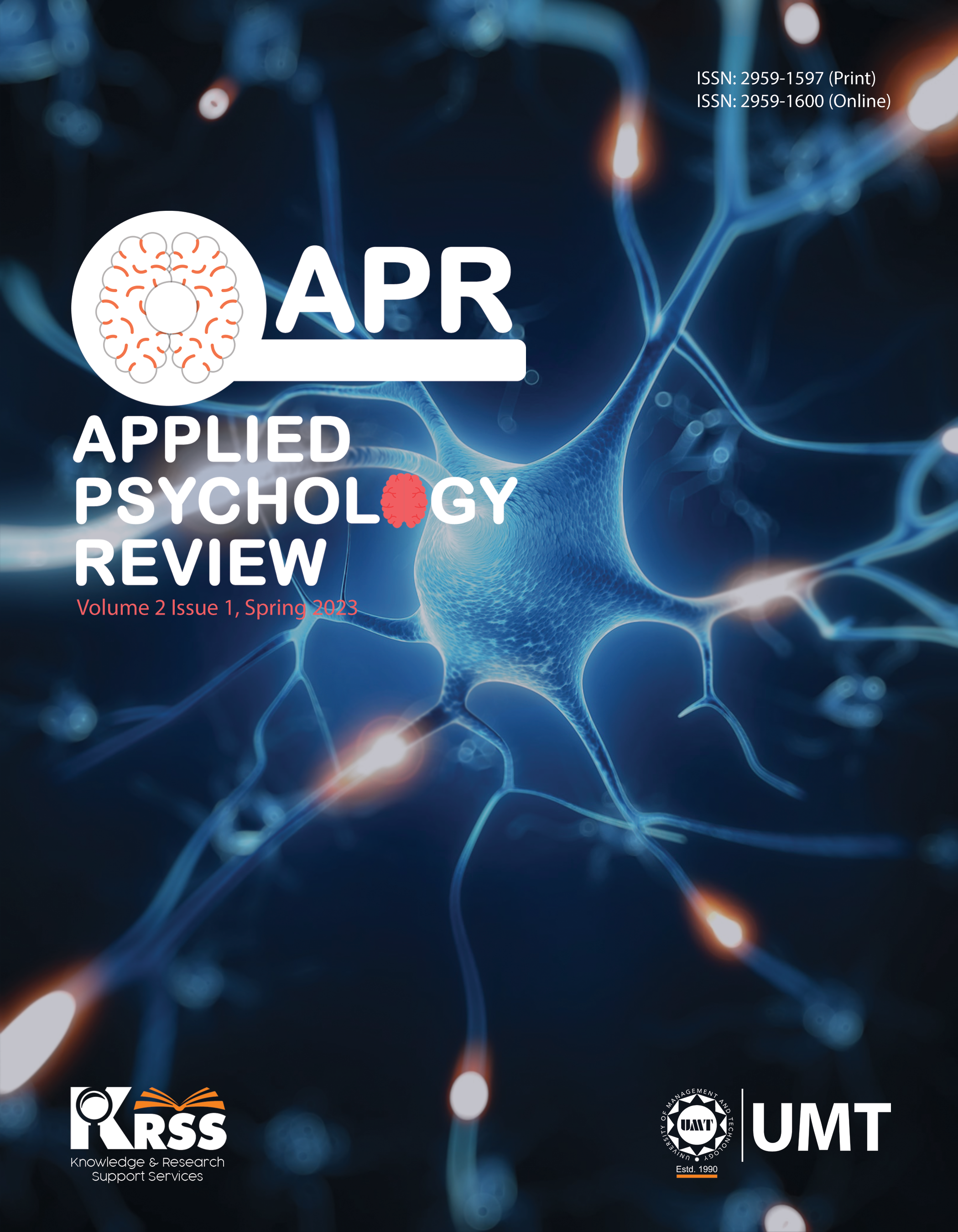Patience, Belief in a Just World and Emotion Regulation in Mothers of Toddlers
Abstract
 Abstract Views: 0
Abstract Views: 0
A correlational study was conducted to examine the relationship between patience, personal belief in a just world and emotion regulation among mothers of toddlers. Using a cross-sectional design, we employed non-probability purposive sampling strategy to recruit mothers (N = 100) of two to four years old children. It was hypothesized that patience and personal belief in a just world would positively predict emotion regulation. It was also expected that personal belief in a just world would moderate the relationship between patience and emotion regulation. Data was collected using the Patience Scale (Fatima & Hafeez, 2013), the Personal Belief in a Just World Scale (Dalbert, 1999), and the Emotion Regulation Questionnaire (Gross & John, 2003). Data was analysed using SPSS version 23. Findings revealed that patience and personal belief in a just world were positively related to emotion regulation. It was also observed that only patience positively predicted emotion regulation. However, the relationship between patience and emotion regulation was not moderated by personal belief in just world. This study had implications for understanding the psychological resources important for emotion regulation while parenting in Pakistani cultural context.
Downloads
References
Abbasi, S. B., & Kazmi, S. F. (2022). Urdu Translation and Validation of Emotion Regulation Questionnaire in Pakistani Adolescents. Pakistan Journal of Social Research, 4(3), 274-285. https://doi.org/10.52567/pjsr.v4i03.712
Ardenghi, S., Russo, S., Bani, M., Rampoldi, G., & Strepparava, M. G. (2023). The role of difficulties in emotion regulation in predicting empathy and patient-centeredness in pre-clinical medical students: A cross-sectional study. Psychology, Health & Medicine, 28(5), 1215–1229. https://doi.org/10.1080/13548506.2021.2001549
Bartholomaeus, J., & Strelan, P. (2019). The adaptive, approach-oriented correlates of belief in a just world for the self: A review of the research. Personality and Individual Differences, 151, 109485. https://doi.org/10.1016/j.paid.2019.06.028
Braatelien, M. R. (2020). Blaming the victim—belief in a just world and domestic violence myth acceptance: A correlational analysis [Doctoral dissertation, Grand Canyon University]. ProQuest Dissertations and Theses Global.
Chen, B., Vansteenkiste, M., Beyers, W., Boone, L., Deci, E. L., Van der Kaap-Deeder, J., Duriez, B., Lens, W., Matos, L., Mouratidis, A., Ryan, R. M., Sheldon, K. M., Soenens, B., Van Petegem, S., & Verstuyf, J. (2015). Basic psychological need satisfaction, need frustration, and need strength across four cultures. Motivation and Emotion, 39(2), 216–236. http://dx.doi.org/10.1007/s11031-014-9450-1
Compare, A., Zarbo, C., Shonin, E., Van Gordon, W., & Marconi, C. (2014). Emotional regulation and depression: A potential mediator between heart and mind. Cardiovascular Psychiatry and Neurology, 2014,324374. https://doi.org/10.1155/2014/324374
Dalbert, C. (1999). The world is more just for me than generally: About the personal belief in a just world scale's validity. Social Justice Research, 12(2), 79–98. https://doi.org/10.1023/A:1022091609047
Dalbert, C., Lipkus, I. M., Sallay, H., & Goch, I. (2001). A just and an unjust world: Structure and validity of different world beliefs. Personality and Individual Differences, 30(4), 561–577. https://doi.org/10.1016/S0191-8869(00)00055-6
Daughter, S. A. I. S. (2022). Forming qualities of patience with the help of hadiths. Pedagogical Sciences and Teaching Methods, 2(18), 233-236. https://interonconf.org/index.php/den/article/download/927/860
Fatima, I., & Khalid, R. (2007). Beliefs in a Just World Questionnaire. Pakistan Journal of Social and Clinical Psychology, 5(1), 15-24.
Fatima. I., & Hafeez. A. (2013). Patience and psychological well-being [Abstract]. http://pu.edu.pk/images/image/Departments/appsy/Psychological_Abstract-2012-14.pdf
Gökçen, G., Arslan, C., & Traş, Z. (2020). Examining the relationship between patience, emotion regulation difficulty and cognitive flexibility. European Journal of Education Studies, 7(7), 131–152. https://doi.org/10.46827/ejes.v7i7.3160
Gross, J. J. (1998). The emerging field of emotion regulation: An integrative review. Review of General Psychology, 2(3), 271-299. https://doi.org/1089-2680/98/$3.00
Gross, J. J. (2014). Emotion regulation: Conceptual and empirical foundations. In: Gross, J.J., (Ed.), Handbook of emotion regulation (2nd ed., pp. 3-20). Guilford. https://www.academia.edu/download/51774644/Cap1-Emotions-Gross.pdf
Gross, J. J. (2015a). Emotion regulation: Current status and future prospects. Psychological Inquiry: An International Journal for the Advancement of Psychological Theory, 26(1), 1-26, https://doi.org/10.1080/1047840X.2014.940781
Gross, J. J. (2015b). The extended process model of emotion regulation: Elaborations, applications, and future directions. Psychological Inquiry, 26(1), 130–137. https://doi.org/10.1080/1047840X.2015.989751
Gross, J. J., & John, O. P. (2003). Individual differences in two emotion regulation processes: Implications for affect, relationships, and well-being. Journal of Personality and Social Psychology, 85(2), 348–362. https://doi.org/10.1037/0022-3514.85.2.348
Jian, K., Sun, S., Dong, H., & Zeng, X. (2021). Belief in a just world, health-related quality of life, and mental health among Chinese patients with chronic obstructive pulmonary disease. Quality of Life Research: An International Journal of Quality of Life Aspects of Treatment, Care and Rehabilitation, 30(1), 157–167. https://doi.org/10.1007/s11136-020-02619-x
Khormaei, F., Dehbidi, F. A., & Haghju, S. (2016). The structural model of relationship between moral virtue of patience and difficulty in emotion regulation among university students. Research in Psychological Health, 10(1), 21-31. https://sid.ir/paper/134058/en
Kwon, H., Yoon, K. L., Joormann, J., & Kwon, J. H. (2013). Cultural and gender differences in emotion regulation: Relation to depression. Cognition & Emotion, 27(5), 769-782. https://doi.org/10.1080/02699931.2013.792244
Lerner, M. J. (1980). The belief in a just world. Springer.
Liu, D. Y., & Thompson, R. J. (2017). Selection and implementation of emotion regulation strategies in major depressive disorder: An integrative review. Clinical Psychology Review, 57, 183-194. https://doi.org/10.1016/j.cpr.2017.07.004
Liu, C., & Ma, J-L. (2019). Adult attachment style, emotion regulation, and social networking sites addiction. Frontiers in Psychology, 10, 2352. https://doi.org/10.3389/fpsyg.2019.02352
Martinez, D. (2022). Patience, its role in our life – A definition academic article. Asia Pacific Journal of Religions and Cultures, 6(1), 17–35. Retrieved from https://so06.tci-thaijo.org/index.php/ajrc/article/view/256230
Megías, J. L., Romero, Y., Ojeda, B., Peña-Jurado, I., & Gutiérrez-Pastor, P. (2019). Belief in a just world and emotional intelligence in subjective well-being of cancer patients. The Spanish Journal of Psychology, 22, E28. https://doi.org/10.1017/sjp.2019.28
Mikolajczak, M., & Roskam, I. (2018). A theoretical and clinical framework for parental burnout: The balance between risks and resources (BR2). Frontiers in Psychology, 9, 8 - 86. https://doi.org/10.3389/fpsyg.2018.00886
Rutherford, H. J., Wallace, N. S., Laurent, H. K., & Mayes, L. C. (2015). Emotion regulation in parenthood. Developmental Review, 36, 1-14. https://doi.org/10.1016/j.dr.2014.12.008
Sanaati, N. I. R., Sabet, F. H., & Motamedi, A. (2018). Role of patience with mediating self-differentiation in emotional regulation and perceived stress among nurses. Islamic Life Style, 2 (4) :211-216.
Schnitker, S. A. (2012). An examination of patience and well-being. The Journal of Positive Psychology, 7(4), 263-280. https://doi.org/10.1080/17439760.2012.697185
Schnitker, S. A., Shubert, J., Ratchford, J. L., Lumpkin, M., & Houltberg, B. J. (2021). Mixed results on the efficacy of the CharacterMe smartphone app to improve self-control, patience, and emotional regulation competencies in adolescents. Frontiers in Psychology, 12, 586713. https://doi.org/10.3389/fpsyg.2021.586713
Smith, R., Persich, M. R., Chuning, A. E., Cloonan, S., Woods-Lubert, R., Skalamera, J., Berryhill, S. M., Weihs, K. L., Lane, R. D., Allen, J. J. B., Dailey, N. S., Alkozei, A., Vanuk, J. R., & Killgore, W. D. S. (2023). Improvements in mindfulness, interoceptive and emotional awareness, emotion regulation, and interpersonal emotion management following completion of an online emotional skills training program. Emotion. https://doi.org/10.1037/emo0001237
Tangney, J. P., Baumeister, R. F., & Boone, A. L. (2004). High self-control predicts good adjustment, less pathology, better grades, and interpersonal success. Journal of Personality, 72(2), 271–324. https://doi.org/10.1111/j.0022-3506.2004.00263.x
Tatsi, S. & Panagiotopoulou, P. (2023). Personal and general belief in a just world and self-esteem in primary school students. Current Psychology, 42, 3330-3339. https://link.springer.com/article/10.1007/s12144-021-01689-5
Vanderlind, W. M., Millgram, Y., Baskin-Sommers, A. R., Clark, M. S., & Joormann, J. (2020). Understanding positive emotion deficits in depression: From emotion preferences to emotion regulation. Clinical Psychology Review, 76, 101826. https://doi.org/10.1016/j.cpr.2020.101826
Wang, J., Wang, Z., Liu, X., Yang, X., Zheng, M., & Bai, X. (2021). The impacts of a COVID-19 epidemic focus and general belief in a just world on individual emotions. Personality and Individual Differences, 168, 110349. https://doi.org/10.1016/j.paid.2020.110349
Copyright (c) 2023 Fatima Basharat, Iram Fatima, Kainaat Yousaf

This work is licensed under a Creative Commons Attribution 4.0 International License.




